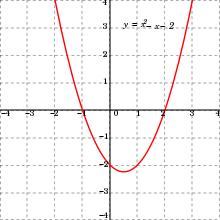
Back متغير مستقل ومتغير تابع Arabic Залежныя і незалежныя зменныя Byelorussian স্বাধীন চলক ও অধীন চলক Bengali/Bangla Variables dependents i independents Catalan Abhängige und unabhängige Variable German Variables dependientes e independientes Spanish Aldagai independente eta dependenteak Basque متغیرهای وابسته و مستقل Persian Riippuvat ja riippumattomat muuttujat Finnish Athróga neamhspleácha agus athróga spleácha Irish
A variable is considered dependent if it depends on an independent variable. Dependent variables are studied under the supposition or demand that they depend, by some law or rule (e.g., by a mathematical function), on the values of other variables. Independent variables, in turn, are not seen as depending on any other variable in the scope of the experiment in question.[a] In this sense, some common independent variables are time, space, density, mass, fluid flow rate,[1][2] and previous values of some observed value of interest (e.g. human population size) to predict future values (the dependent variable).[3]
Of the two, it is always the dependent variable whose variation is being studied, by altering inputs, also known as regressors in a statistical context. In an experiment, any variable that can be attributed a value without attributing a value to any other variable is called an independent variable. Models and experiments test the effects that the independent variables have on the dependent variables. Sometimes, even if their influence is not of direct interest, independent variables may be included for other reasons, such as to account for their potential confounding effect.

Cite error: There are <ref group=lower-alpha> tags or {{efn}} templates on this page, but the references will not show without a {{reflist|group=lower-alpha}} template or {{notelist}} template (see the help page).
- ^ Aris, Rutherford (1994). Mathematical modelling techniques. Courier Corporation.
- ^ Boyce, William E.; Richard C. DiPrima (2012). Elementary differential equations. John Wiley & Sons.
- ^ Alligood, Kathleen T.; Sauer, Tim D.; Yorke, James A. (1996). Chaos an introduction to dynamical systems. Springer New York.
- ^ Hastings, Nancy Baxter. Workshop calculus: guided exploration with review. Vol. 2. Springer Science & Business Media, 1998. p. 31
© MMXXIII Rich X Search. We shall prevail. All rights reserved. Rich X Search